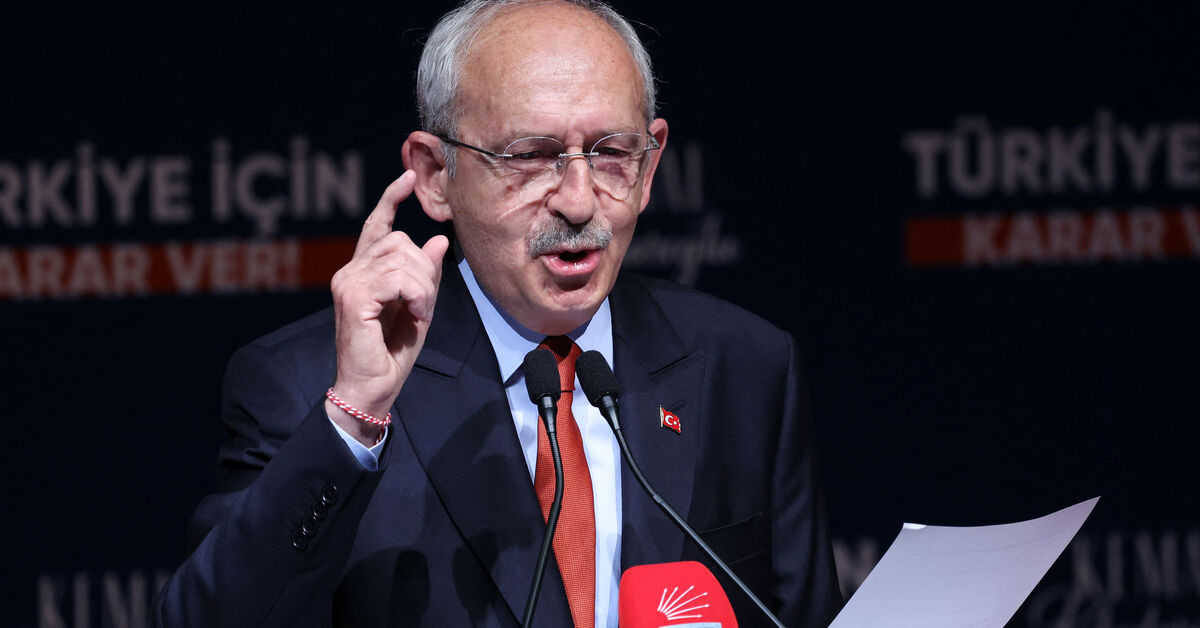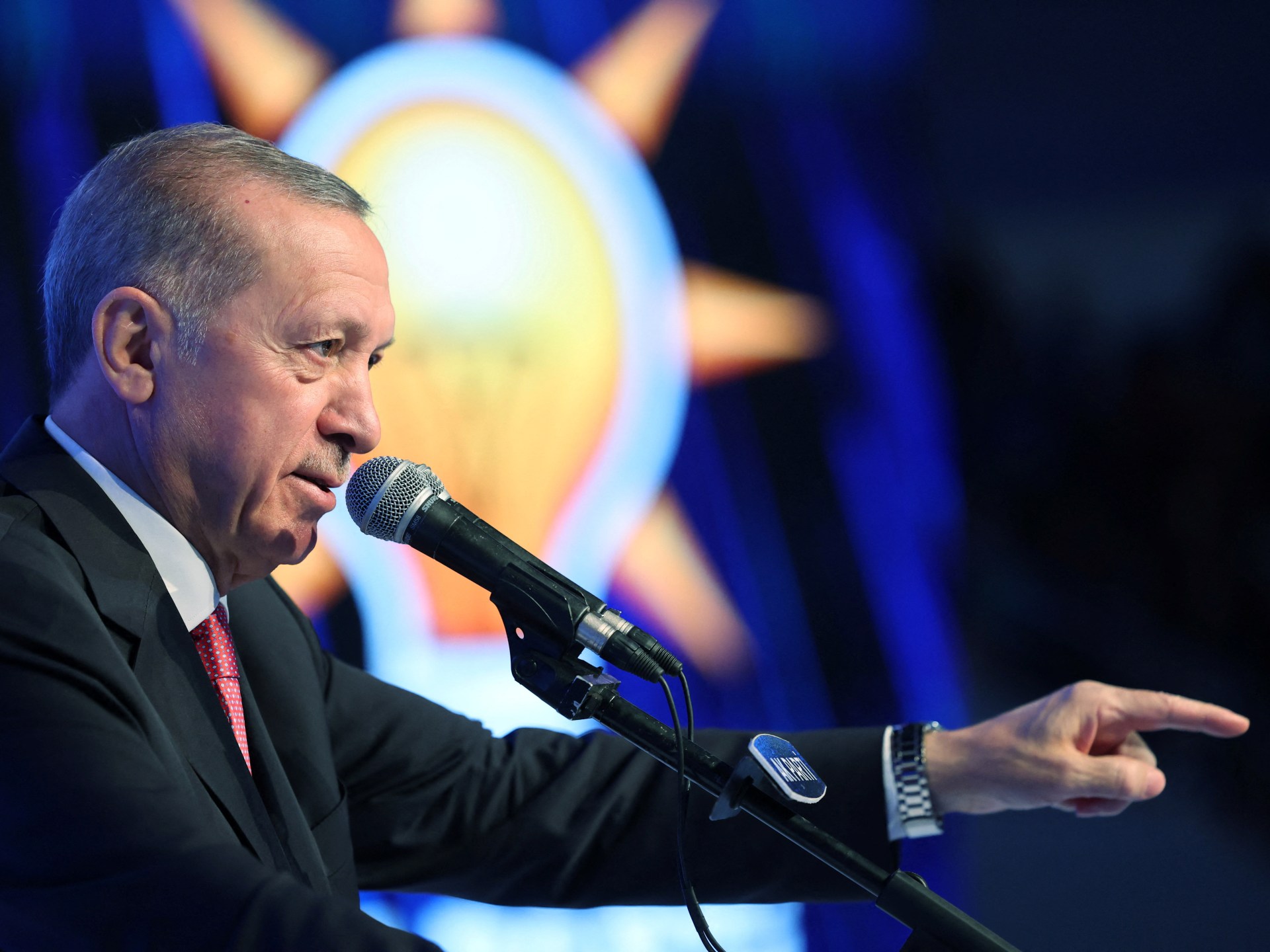Turkey Elections: Erdogan rival ups nationalist tone, vows to send refugees home
IZMIR, Turkey — With a little over a week to go until a crucial runoff to determine Turkey’s next president, opposition candidate Kemal Kilicdaroglu held his first presser since the elections, striking a nationalist tone by pledging to send refugees home immediately upon taking power.
In an unusually hawkish speech Thursday, Kilicdaroglu targeted incumbent President Recep Tayyip Erdogan, who led the first round of Turkey’s nail-biter presidential polls by 5% on May 14, for allowing the unregulated influx of refugees and asylum seekers.
“I am declaring hereby, I will send all refugees back home as soon as I am elected as president, period,” said Kilicdaroglu, claiming that the present government’s open-border policy would bring “10 million refugees more” if they were reelected.
“Erdogan, you have neither protected this country’s honor nor its borders. You have brought 10 million refugees to this country. Like this wasn’t enough, you sold the citizenship of the Republic of Turkey to import votes; you turned Turks into refugees in their own country,” Kilicdaroglu told a cheering crowd at his party headquarters in Ankara, where he pushed his new campaign slogan, #MakeUpYourMind.
Turkey, which has hosted the largest displaced population worldwide since 2014, has 4 million registered refugees, asylum seekers and displaced people, including 3.5 million Syrians under temporary protection.
“It is difficult to pin down a number since there is considerable irregular migration too. However, my guess is 7 million at maximum; anything more would be exaggerated,” Murat Erdogan, the author of “Syrian Barometer” and a migration expert, told Al-Monitor.
Kilicdaroglu has put the number of refugees in Turkey at 10 million for the first time since the elections. Umit Ozdag’s far-right Victory Party says there are 13 million refugees in Turkey and claims, with dystopian video clips, that in two decades, Syrians will be a majority in the country. Victory Party did not win any parliament seats. However, Sinan Ogan, the presidential candidate of Ata Alliance, which is made of Victory and other small ultranationalist parties, got an unexpected 5.2% in nationalist and protest votes.
Kilicdaroglu, who garnered some 24.6 million votes to Erdogan’s 27.1 million on May 14, aims to attract some of the 2.8 million by fiery and belligerent rhetoric to show that “soft-spoken grandpa” has a warrior side.
“No more heart gestures and flowers. Kilicdaroglu is now going straight to the government’s soft belly — the migration issue — with heightened nationalist and nativist discourse,” Ilteris Ergun, a Turkish political scientist whose research focuses on authoritarian regimes, told Al-Monitor.
“He learned the hard way that economic difficulties are not enough to unseat a populist authoritarian regime, which already has a narrative that blames external and internal enemies for it. Kilicdaroglu could not get enough of the disgruntled vote in the first round, losing some of them to Ogan. So now he is trying to get them by drumming up anti-immigration rhetoric,” said Ergun.
Kilicdaroglu and members of his Nation’s Alliance — which contains five right-wing parties, including Meral Aksener’s Good Party — have said that they’d send Syrians under temporary protection in Turkey back home within two years and stop Turkey from being a “buffer country” between Europe and troubled regions in the Middle East and Asia. The alliance’s election memorandum uses tame language, underlining “the safe return” of Syrians “as soon as possible” and “in accordance with domestic and international laws.”
Kilicdaroglu, a soft-spoken former bureaucrat, said in the past that Syrians would return through dialogue with Syrian President Bashar al-Assad. He also said he’d renegotiate the 2016 deal between Turkey and the European Union, where Turkey got EU funds to help Syrians settle in Turkey rather than try to reach Western Europe.
But on Thursday, Kilicdaroglu sharpened his tone, referring to refugees and asylum seekers as potential “crime machines” who may, in the future, control and loot cities. He also dropped the two-year time frame.
“More than 85% of the Turks want the Syrians to go back and consider their presence one of the top three problems in Turkey,” migration expert Erdogan said. “More than 55% say that refugees would be one of the issues they’d consider while they cast their vote. Given those conditions, the mainstream political parties’ rhetoric of voluntary repatriation has changed, step by step, to repatriation ‘by force if necessary.’”
Interior Minister Suleyman Soylu said Wednesday that Turkey had sent half a million Syrians back. “We have not turned Turkey into a refugee warehouse, nor do we intend to do so,” he added.
In a fence-mending effort prompted by Russian President Vladimir Putin, Ankara has stepped up its efforts to speed up the newfound dialogue between the Turkish and Syrian governments in an apparent bid to secure a leaders’ summit between Erdogan and Assad to discuss the question of Syrian refugees and the big picture in Syria. Assad, meanwhile, seemed to be dragging his feet on plans to hold a leaders’ summit. “The ruling party’s voters also want the Syrians to return, but Erdogan maintains his position of voluntary return,” migration expert Erdogan said.
Who supports terrorists?
Kilicdaroglu lambasted Erdogan Thursday on corruption and economic mismanagement and accused him, particularly, of supporting terrorism. “I have never sat down with terrorists, nor will I ever do so,” he said, in reference to peace talks that collapsed in 2015 between Kurdish militants and the Turkish government. He was responding to the incumbent president’s claims that Kilicdaroglu, who has Kurdish votes on his side, was the puppet of the Kurdistan Workers Party (PKK), which has fought an insurgency in southeastern Turkey since 1984 and is designated as a terrorist organization by Ankara and several other Western capitals.
“But, Erdogan, you sat at their table and had backdoor dealings with them. You plotted with FETO against our loyal army,” Kilicdaroglu charged, referring to US-based cleric Fethullah Gulen and his supporters. Ankara accuses the Gulenist network of masterminding the 2016 coup attempt to overthrow Erdogan.
The revamped rhetoric, with a belligerent tone on terrorism and migration, comes after Ogan said he will only back a candidate who cracks down on migrants and fights “terrorism.” He and Ozdag say they will announce in the coming days which of the candidates they support — if they can agree.
Local media reported that Ahmet Davutoglu, the chair of the Future Party in Kilicdaroglu’s National Alliance, met with Ogan late Wednesday and that Ozdag and Kilicdaroglu will come together Friday.
“Kilicdaroglu has a tough time trying to consolidate nationalist democrats, conservative democrats, social democrats and Kurdish democrats for the runoff,” Ergun said, predicting a lower turnout in the runoff. “He may think the anti-immigration sentiment is a cross-cutting issue, but this revamped nationalist discourse may risk alienating some of his first-time voters.”
Hungarian rhapsody replayed
“Kilicdaroglu’s main issue is that he lacks charisma,” Ergun, who studied the rise of Prime Minister Victor Orban in Hungary and his 2022 defeat of the opposition’s six-party platform, said. “Often, though not always, a populist authoritarian with charisma can only be defeated by another charismatic figure. In Hungary, Peter Marki-Zay, an economist and a family man who was the joint candidate of a platform of six, failed to defeat Orban.”
It is no coincidence that Orban, the poster boy of “illiberal democracy” within the European Union, was among the first to congratulate Erdogan. “Good luck for the second round, President! A strong and stable #Turkey is good for Hungary, good for Europe, and good for the world,” he tweeted.
I just called President @RTErdogan to congratulate him on his overwhelming victory in the first round of the presidential elections, and the outstanding and unquestionable victory of @Akparti at the recent Turkish parliamentary elections. Good luck for the second round … pic.twitter.com/W1ayxB6yBq
— Orbán Viktor (@PM_ViktorOrban) May 17, 2023
“These are sister regimes, and Erdogan uses Orban’s playbook in many ways, including gerrymandering to anti-LGBT and pro-family rhetoric,” Ergun said. “And when the incumbent wins, as Orban did for the fourth time, it leads to the public’s loss of trust not only in the opposition but in the whole system. In such a win, it is not simply the opposition that collapses, but societal resistance.”



